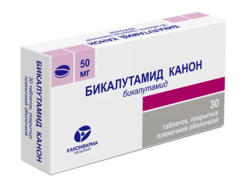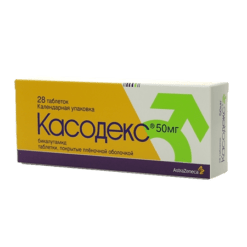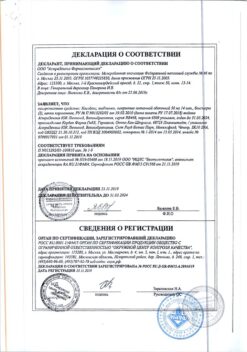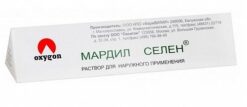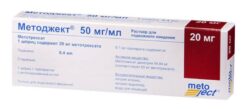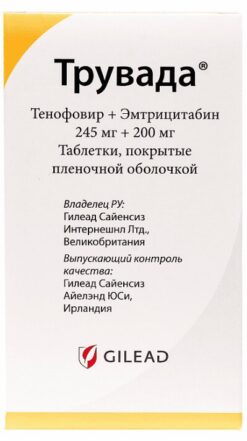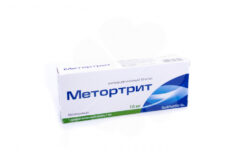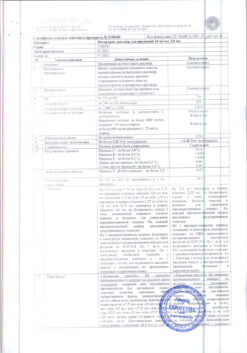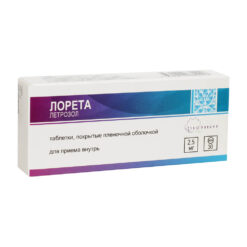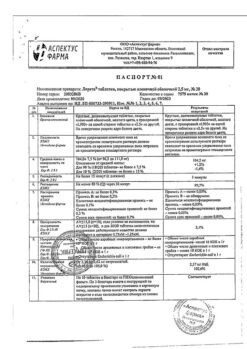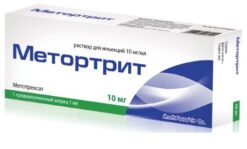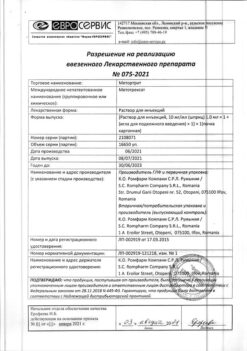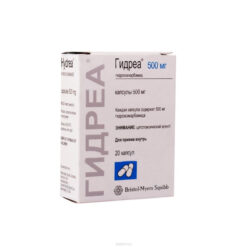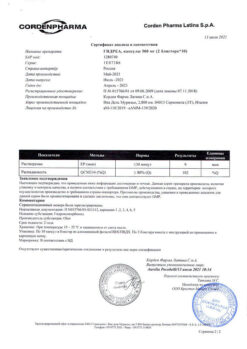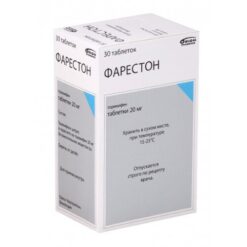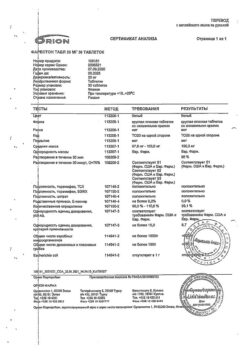No products in the cart.
Description
Pharmacotherapeutic group
Antiandrogenic antitumor drug
ATX code
L02BB03
Pharmacodynamics:
Bicalutamide is a racemic mixture with nonsteroidal anti-androgenic activity of the predominantly (R)-enantiomer with no other endocrine activity. Bicalutamide binds to androgen receptors and, without activating gene expression, suppresses the stimulating effect of androgens. This results in regression of prostate malignancies.
In some patients, discontinuation of bicalutamide can lead to the development of clinical “antiandrogen withdrawal syndrome.
Pharmacokinetics:
After oral administration, it is rapidly and completely absorbed from the gastrointestinal tract. Food intake does not affect absorption.
The (S)-enantiomer is eliminated from the body much faster than the (R)-enantiomer the half-life of the latter is about 7 days.
When taking bicalutamide daily, the plasma concentration of the (R)-enantiomer increases about 10-fold due to the long half-life of the latter, which makes it possible to take the drug once daily.
When bicalutamide is taken daily at a dose of 50 mg, the equilibrium plasma concentration of the (R)-enantiomer is about 9 mcg/ml. When bicalutamide is administered at 150 mg daily, the equilibrium concentration of (R)-enantiomer is approximately 22 µg/mL. At equilibrium about 99% of all circulating enantiomers in the blood is the active (R)-enantiomer.
The pharmacokinetics of the (R)-enantiomer is not affected by age of mild renal impairment and moderate hepatic impairment. There is data that in patients with severe hepatic impairment the elimination of (R)-enantiomer from plasma is delayed.
The binding to plasma proteins is high (for racemic mixture 96% for (R)-enantiomer 996%). Intensively metabolized in the liver (by oxidation and formation of conjugates with glucuronic acid). Metabolites are excreted with urine and bile in approximately equal proportions.
Indications
Indications
– Proliferative prostate cancer in combination with a GnRH (gonadotropin-releasing hormone) analogue or surgical castration;
– Locally advanced prostate cancer (T3-T4 any N M0; T1-T2 N+ M0) as monotherapy or adjuvant therapy in combination with radical prostatectomy or radiotherapy;
– locally advanced non-metastatic prostate cancer in cases where surgical castration or other medical interventions are not applicable or are unacceptable.
Active ingredient
Active ingredient
Composition
Composition
Active ingredients:
Bicalutamide 150 mg.
Excipients:
Lactose monohydrate (milk sugar) 183.0 mg,
Potato starch – 81,0 mg,
Povidone K 25 (polyvinylpyrrolidone K25) – 21,0 mg,
Sodium carboxymethyl starch – 9.0 mg,
Magnesium stearate – 3.0 mg,
Silica colloidal dioxide – 3.0 mg.
The composition of the film coating:
Aquarius Prime VAR218010 White [Hypromellose – 65% – 13.5 mg.
Titanium dioxide-25%, macrogol (polyethylene glycol) – 10%]
How to take, the dosage
How to take, the dosage
Adult and elderly men:
In advanced prostate cancer in combination with a GnRH analogue or surgical castration: orally, 50 mg once daily. Bicalutamide treatment should be started at the same time as starting GnRH analogue or surgical castration.
In locally advanced prostate cancer: orally, 150 mg once daily. Bicalutamide should be taken long-term for at least 2 years. If there are signs of disease progression, the drug should be stopped.
With impaired renal function: No dose adjustment is necessary.
Hepatic disorders: dose adjustment is not required in mild to moderate hepatic insufficiency. In severe hepatic impairment although the T1/2 of active enantiomer bicalutamide is increased by 76% but no dose adjustment is required.
Interaction
Interaction
There are no data on pharmacokinetic or pharmacodynamic interactions between bicalutamide and GnRH analogues.
In in vitro studies, the (R)-enantiomer of bicalutamide has been shown to inhibit the CYP3A4 isoenzyme with less effect on the activity of the CYP2C9 2C19 and 2D6 isoenzymes. No potential ability of bicalutamide to interact with other drugs has been found; however, when used for 28 days against midazolam, the area under the curve “concentration-time” (AUC) of midazolam increases by 80%.
Incompatible with terfenadine astemizole cisapride.
Caution should be exercised when prescribing bicalutamide concomitantly with cyclosporine or slow calcium channel blockers. It may be necessary to reduce the dose of these drugs especially in case of potentiation or development of side effects. Careful monitoring of cyclosporine plasma concentrations and the patient’s clinical condition is recommended after initiation or withdrawal of bicalutamide.
The concomitant use of bicalutamide and drugs with microsomal oxidation inhibitors such as cimetidine or ketoconazole may increase plasma concentrations of bicalutamide and may lead to increased incidence of side effects.
Enhances the effect of indirect anticoagulants (coumarin derivatives) including warfarin (competition for binding to plasma proteins).
Special Instructions
Special Instructions
Given the possibility of delayed excretion and cumulation of bicalutamide in patients with impaired liver function, periodic assessment of liver function is advisable. Most changes in liver function occur within the first six months of treatment with bicalutamide.
If significant changes in liver function develop, bicalutamide should be discontinued.
In patients with disease progression with elevated prostate-specific antigen (PSA) concentrations, discontinuation of bicalutamide treatment should be considered.
If bicalutamide is prescribed to patients receiving indirect anticoagulants (coumarin derivatives) including warfarin, regular monitoring of prothrombin time is recommended.
Each tablet of Bicalutamide 50 mg contains 61 mg of lactose monohydrate. Each tablet of the drug Bicalutamide 150 mg contains 183 mg of lactose monohydrate.
With regard to possible inhibition of cytochrome P450 activity (CYP3A4 isoenzyme) by bicalutamide, caution should be exercised when concomitant administration of bicalutamide with drugs primarily metabolized with participation of CYP3A4 isoenzyme.
Bicalutamide may affect the ability of patients to drive vehicles or engage in other potentially hazardous activities that require increased concentration and quick psychomotor reactions due to dizziness and somnolence when bicalutamide and GnRH analogues are used in combination.
Contraindications
Contraindications
– Hypersensitivity to bicalutamide and excipients of the drug;
– concomitant administration with terfenadine astemizole and cisapride;
– Bicalutamide should not be administered to children and women.
Due to the presence of lactose in the composition: lactase deficiency lactose intolerance glucose-galactose malabsorption.
Side effects
Side effects
The pharmacological effects of bicalutamide may cause the following side effects:
– very common (>10%): gynecomastia (may persist even after stopping therapy especially if the drug is taken for a long time) breast soreness “hot flashes”;
– common (â¥1% and <10%): diarrhea nausea transient increase in “hepatic” transaminase activity cholestasis and jaundice (the described changes in liver function were rarely evaluated as serious were transient completely disappeared or decreased with continuation of therapy or after drug withdrawal) itching asthenia: when using the drug at a daily dose of 150 mg – alopecia or hair growth recovery decreased libido sexual dysfunction increased body weight.
– rare (â¥01% – <1%): hypersensitivity reactions including angioedema and urticaria interstitial lung disease; when using the drug in a daily dose of 150 mg – abdominal pain depression dyspepsia hematuria;
– very rare (â¥001% – <01%): vomiting dry skin (when using the drug at a daily dose of 150 mg dry skin is observed frequently) hepatic failure (causal relationship with bicalutamide intake is not reliably established).
The following adverse events may also occur with a frequency of ⥠1% when bicalutamide and GnRH analogues are used concomitantly (causal relationship to drug administration has not been established some of the side effects noted occurred in older patients):
Cardiovascular side effects: heart failure.
Gastrointestinal tract: anorexia dry mouth dyspepsia constipation flatulence.
Central nervous system: dizziness headache insomnia increased sleepiness.
Respiratory system: shortness of breath.
Hyrogenital system: sexual dysfunction nycturia polyuria.
Hematopoietic system: anemia.
Skin and its appendages: alopecia skin rash increased sweating hirsutism.
Others: diabetes mellitus hyperglycemia weight gain or loss abdominal pain chest pain pelvic pain chills.
Overdose
Overdose
There have been no cases of overdose in humans. There is no specific antidote.
The treatment is symptomatic. Dialysis is not effective because bicalutamide is firmly bound to plasma proteins and is not excreted unchanged in the urine. General supportive therapy and monitoring of vital body functions are indicated.
Pregnancy use
Pregnancy use
Similarities
Similarities
Additional information
| Weight | 0.029 kg |
|---|---|
| Shelf life | 2 years. Do not use after the expiration date on the package. |
| Conditions of storage | In a dry place protected from light at a temperature not exceeding 25°C. Store out of the reach of children. |
| Manufacturer | Drug Technology, Russia |
| Medication form | pills |
| Brand | Drug Technology |
Other forms…
Related products
Buy Bicalutamide, 150 mg 30 pcs with delivery to USA, UK, Europe and over 120 other countries.


